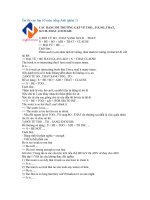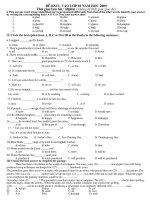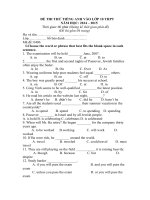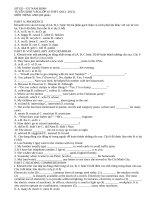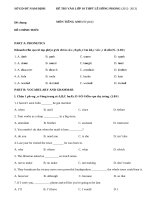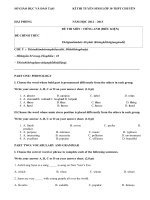đề luyện thi chuyên tiếng anh vào lóp 10
Bạn đang xem bản rút gọn của tài liệu. Xem và tải ngay bản đầy đủ của tài liệu tại đây (735.01 KB, 13 trang )
ĐỀ LUYỆN VÀO 10 CHUYÊN SỐ 5
TRƯỜNG THPT CHUYÊN
THPT NGUYỄN HUỆ
ĐỀ THI THỬ LẦN 4
KỲ THI TUYỂN SINH VÀO LỚP 10 CHUYÊN
NĂM HỌC 2015 – 2016
Môn thi: TIẾNG ANH (CHUYÊN)
Ngày thi: 24 tháng 5 năm
2015 Thời gian làm bài:
120 phút
USE OF ENGLISH, READING AND WRITING (100 pts)
I. PHONETICS
a. (ID: 124748) Questions 1-4: Choose the word whose underlined part is pronounced differently from
the others in
each
C or
D and then write your C.
answers
pts)
1.
A. group
exerciseby circling A, B, B.
excuse
expendin the box below. (4D.
extinction
2. A. supposed
B. mixed
C. realized
D. widened
3. A. sewage
B. respond
C. pleasure
D. practise
4. A. match
B. touching
C. technique
D. kitchen
1.
2.
3.
4.
b. (ID: 124753) Questions 5-8: Choose the word whose main stressed pattern is not the same as that of
the others by circling A, B, C or D and then write your answers in the box below. (4 pts)
5. A. advocate
B. sociable
C. habitat
D. eradicate
6. A. integration
B. intellectual
C. environment
D. economic
7. A. obvious
B. notorious
C. credulous
D. numerous
8. A. recommend
B. innovate
C. minimize
D. decorate
5.
6.
7.
8.
II. VOCABULARY & GRAMMAR
a. (ID: 124758) Questions 9-23: Choose the word or phrase which best complete these sentences by
circling A, B, C or D and then write your answers in the box below. (15 pts)
9. To promote him you must have a very high
of his ability.
A. opinion
B. view
C. idea
D. feeling
10. The bad weather
the plane being delayed.
A. resulted in
B. made
C. caused
D. created
11. There is
to be frightened of the dog. He’s quite harmless.
A. a fear
B. no fear
C. no need
D. any reason
12. The fire
rapidly because of strong wind.
A. spread
B. sank
C. ran
D. burnt
13. He could not pay his debts;
, he was imprisoned.
A. consequently
B. certainly
C. unluckily
D. supposedly
14. Although he shouted, he could not make his voice
.
A. hear
B. to hear
C. heard
D. to be heard
15. I hope you won’t take
if I tell you the truth.
A. annoyance
B. offence
C. resentment
D. irritation
16.
hired on short-term contracts.
A. The rest staff has been
B. The rest of the staff has been
B. The rest staff have been
D. The rest of the staff have been
17. I must go to the dentist and
.
A. get my teeth to take care of
B. take care of my teeth
C. my teeth be taken care of
D. get my teeth taken care of
18. _______ on business, she would attend my birthday party now.
>> Truy cập để học Toán – Lý – Hóa – Sinh – Văn – Anh tốt nhất!
1
A. Were my sister not away
B. Weren’t my sister away
C. Was my sister away not
D. If my sister not be away
19. The creation of nature reserves will help to ensure the
of many endangered species.
A. extinction
B. survival
C. elimination
D. disappearance
20. Throughout history, the moon has inspired not only song and dance
.
A. but poetry and prose as well
B. but poetry also prose
C. together with poetry and prose
D. and also poetry and prose
21. She rang to make an early
at the hairdressers.
A. order
B. date
C. assignment
D. appointment
22. The
bought from that factory
_ faulty.
A. equipment / was
B. equipments / are C. equipment / were
D. equipments / were
23. English is believed _
in the world.
A. is the most important language
B. to play important language
C. to the most important language
D. to be the most important language
9.
10.
11.
12.
13.
14.
15.
16.
17.
18.
19.
20.
21.
22.
23.
b. (ID: 124774) Questions 24-33: Fill a suitable preposition in each space to complete the following
sentences. Write your answers in the box below. (10 pts)
24. I wanted to go home but my brother insisted
going to a night-club.
25. He was taken
_ by her aggressive attitude.
26. I didn’t know what to say. I was
a loss for words
27. Allen was very unhappy when his marriage broke
two years ago.
28. She got a job so that she could be independent
her parents.
29. Look
what you have written before handing it to the examiner.
30. You’d better put
your cigarette because smoking isn’t allowed in here.
31. The advantage of setting
early is that you’ll be able to miss all the heavy traffic.
32. The manager promised to look
the matter in response to my letter.
33. It amazes me how some women can cope
both a job and a family.
24.
25.
26.
27.
28.
29.
30.
31.
32.
33.
c. (ID: 124785) Questions 34-41: Give the correct form of the words given in the brackets to
complete the passage. Write your answers in the box below. (8 pts)
THE STAIRLIFT
It’s is that the very things that are supposed to provide access to the upper floors of buildings – stairs
– often, in fact, make them (34. ACCESS)
. For many elderly people and others with limited
(35. MOBILE)
, getting upstairs can be a daily problem to be (36. COME)
.
However, stairlifts have been helping people solve that problem since they first appeared in the US in the
1930s. Designs have (37. GO) _ many changes over the years and stairlifts have become (38.
PROGRESS)
safer and easier to use. Most consist of a seat which moves along rails that run along the wall.
The user controls how (39. RAPID)
the seat moves along the rails as it travels
from
the bottom of the stairs to the landing at the top. In today’s models, the (40. MOVE)
is controlled
by computers to give a smooth ride and the components are designed to (41. STAND)
constant
use. Many people have been given a new lease of life by the stairlift.
>> Truy cập để học Toán – Lý – Hóa – Sinh – Văn – Anh tốt nhất!
2
34.
35.
36.
37.
38.
39.
40.
41.
d. (ID: 124794)Questions 42-46: Use the correct forms of the phrasal verbs in the box to complete
the sentences. There are two extra ones. You should use each phrasal verb only once. Write your
answers in the box below. (5 pts)
look up
stand for
fall into
break down
give up
build up
back on
42. A large number of churches
ruin after the Second World War.
43. I will not
your bad attitude any longer.
44. I’m very disappointed in you. I didn’t think you were the sort of person who would go ________his
word.
45. Every Vietnamese
to President Ho Chi Minh.
46. You need to
your strength if you want to take part in the marathon.
42.
43.
44.
45.
46.
e. (ID: 124800) Questions 47-50: Complete the sentences by finding ONE word which fits in all
three spaces to make meaningful sentences. Write your answers in the box below. (4 pts)
47.
a. We’re definitely living in the
of information.
b. This particular wine doesn’t really mature with
.
c. It’s time you started acting your
, young man!
48.
a. I’m starting to
_ to the conclusion that you don’t want to go on holiday with me.
b. How did you
to lose your passport?
c. I know it’s going to
as a bit of a shock to you, but I’ve decided to walk round the world.
49.
a. My dad’s involved in
a campaign to stop them building the new motorway near here.
b. These vehicles have the advantage of
on electricity, rather than petrol.
c. You won’t be able to avoid
into problems, so just deal with them when they arise.
50.
a. Helen and I are barely on
terms these days.
b. Generally
, we liked your screenplay very much.
c. Well,
as someone who’s in the public eye constantly, I must say I do value my privacy.
47.
48.
49.
50.
III. READING
a. (ID: 124805) Questions 51-60: Fill ONE suitable word in each space to complete the passage.
Write your answers in the box below. (10 pts)
Many actors do not like working with children or animals. This is probably (51)
they are afraid
that the audience may become (52)
interested in the children and animals than in them.
Actors can have problems (53)
a different kind when they are required to eat or drink on stage.
If they have (54)
much food in their mouths, the words they say may not (55)
clear,
>> Truy cập để học Toán – Lý – Hóa – Sinh – Văn – Anh tốt nhất!
3
and they may even end up coughing or choking.
Other problems can occur with food (56) __ films are being made. In a recent film, during which a
family was waiting to have a meal, one of the actors entered with a large roast chicken on a tray and
started cutting some meat from it while he was speaking. Having cut off a whole chicken leg he
completely forgot
(57)
his next words were. The scene had to be filmed (58) . This would not really have
mattered (59)
there had been another roast chicken in the studio, but there was not. At first,
nobody knew what to do, but eventually the problem was solved (60) putting a nail in the leg and
attaching it back onto the chicken.
51.
52.
53.
54.
55.
56.
57.
58.
59.
60.
b. (ID: 124816) Questions 61-70: Read and circle the best option (A, B, C or D) for each space to
complete the passage. Write your answers in the box below. (10 pts)
The combination of music and study has long has long been a source of disagreement between adults and
children. Parents and teachers alike maintain that silence is important when learning, (61)
young
Now a study shows that the grown-ups have been (62)
all along. Psychologists in Florida
tested how fast students wrote essays with and without music in the background. They found that the
sounds (63)
progress down by about sixty words per hour. “This demonstrates clearly that it is difficult to (64)
with listening and writing at the same time,” said Dr Sarah Randall. She also (65)
to
the conclusion that it is a myth that instrumental music is less distracting than vocals. “All types of
music (66)
the same effect,” she said in her report. “One’s ability to pay attention and write fluently is likely
to be (67)
by both vocal and instrumental music,” she added.
Dr Randall claimed the research (68)
that the idea that music could improve performance
was wrong. “Writing an essay is complex (69)
. You are recalling information and putting it in
(70)
. An additional stimulus in the form of music is bound to distract. But music is not the
only distractor. What is particularly worrying is that more and more teenagers are studying in front of the
television.”
61. A. whereas
B. unlike
C. besides
D. despite
62. A. precise
B. right
C. valid
D. true
63. A. slowed
B. reduced
C. lowered
D. decreased
64. A. manage
B. support
C. cope
D. stand
65. A. reached
B. drew
C. arrived
D. came
66. A. made
B. had
C. brought
D. kept
67. A. disturbed
B. interfered
C. bothered
D. shocked
68. A. pointed
B. displayed
C. demonstrated
D. presented
69. A. project
B. concern
C. scheme
D. task
70. A. order
B. arrangement
C. line
D. pattern
61.
62.
63.
64.
65.
66.
67.
68.
69.
70.
>> Truy cập để học Toán – Lý – Hóa – Sinh – Văn – Anh tốt nhất!
4
c. (ID: 124827) Questions 71-77: You are going to read an article written by someone who lives in a
house in a valley. Seven sentences have been removed from the article. Choose from the sentences A
– H the one which fits each gap (71-77). There is one extra sentence which you do not need to use.
Write your answers in the box below. (7 pts)
LIVING IN THE
VALLEY
We had been living in our valley for sixteen months when we first realized the dangers that could exist in
the surrounding hills and threaten our very survival.
(71)
Until that time, we had felt safe and sheltered in our valley below the protecting hills.
Soon snow began to fall. Within a day it lay some 15 centimeters
deep. (72)
But o
And yet we knew that there was reason for us to worry. The snow and wind were certainly inconvenient
but they did not really trouble us greatly. (73) _
It reminded us of what could have occurred
if circumstances had been different, if the flow of water from the hills had not, many years before, been
controlled, held back by a series of dams.
In a short time the snow started to melt. Day after day, we watched furious clouds pile up high over the
hills to the west. Sinister grey clouds extended over the valleys. (74)
We had seen enough of the
sky; now we began to watch the river, which every day was becoming fuller and wilder.
The snow was gradually washed away as more and more rain streamed from the clouds, but high up in the
hills the reservoir was filling and was fast approaching danger level. And then it happened – for the first
time in years the reservoir overflowed. (75)
The river seemed maddened as the waters poured almost horizontally down to its lower stretches. Just a
couple of metres from our cottage, the stream seemed wild beneath the bridge. (76)
For
three
days we prayed that it would stay below its wall. Fortunately, our prayers were answered as the dam held
and the waters began to subside.
On many occasions through the centuries before the dam was built, the river had flooded the nearby
villages in just such a range. Now, though, the dam restricts the flow of the river and usually all is well;
the great mass of water from the hills, the product of snow and torrential rain, remains behind its barrier
with just the occasional overflow. (77) Thanks to this protection we can feel our home in the
valley is still secure and safe.
A It was the river, the Ryburn, which normally flowed so gently, that threatened us most.
B
And yet the immense power of all this water above us prevents us from ever believing ourselves to be
completely safe in our home.
C
They twisted and turned, rising eastwards and upwards warning of what was to come.
D
It was far deeper than we’d ever seen it so near our home, lunging furiously at its banks.
>> Truy cập để học Toán – Lý – Hóa – Sinh – Văn – Anh tốt nhất!
5
E
We can thus enjoy, rather than fear, the huge clouds that hang over the valley, and can be thrilled by the
tremendous power which we know the river possesses.
F
It almost completely blocked our lane and made the streamside path slippery and dangerous.
G
There in the heights it was like the Niagara Falls, as the water surged over the edge of the dam and
poured into the stream below.
H
It was the year when the storms came early, before the calendar even hinted at winter, even before
November was out.
71.
72.
73.
74.
75.
76.
77.
IV. WRITING
a. (ID: 124835) Questions 78-81: Finish each of the following sentences in such a way that it means
the same as the sentence printed before it. (4 pts)
78. “I admit that I forgot to turn on the alarm system,” said Robert.
Robert confessed to
79. He could not beat Raphael because she was not patient enough.
Had he
80. The police didn’t recognize the murderer till he suddenly rushed out.
It was not
81. Alice and John didn’t decide to move to a bigger house until after the birth of their second son.
Only when
b. (ID: 124840) Questions 81-85: Rewrite each of the following sentences by using the word given in
such a way that it means the same as the sentence printed before it. Do not alter the given words in
any way. (4 pts)
82. John impressed his new boss by setting down to work quickly. (GOOD)
83. I found it difficult to follow the instructions. (TROUBLE)
84. Noise is something that it is not possible for me to tolerate. (PUT)
85. The music teacher was the only member of staff not to attend the farewell party. (EXCEPTION)
c. (ID: 124845) Questions 86-95: Write about the following topic: (15 pts)
Some people say that the Internet provides people with a lot of valuable information. Others think
access to so much information creates problems. Which point of view do you agree with?
>> Truy cập để học Toán – Lý – Hóa – Sinh – Văn – Anh tốt nhất!
6
Give reasons for your answer and include any relevant examples from your knowledge or
experience. Write at least 250 words.
.......................................................................................................................................
…………………………………………………………………………………………
…………………………………………………………………………………………
…………………………………………………………………………………………
…………………………………………………………………………………………
…………………………………………………………………………………………
……………………………………………………………………………………........
>> Truy cập để học Toán – Lý – Hóa – Sinh – Văn – Anh tốt nhất!
7
TRƯỜNG THPT CHUYÊN
NGUYỄN HUỆ
ĐỀ THI THỬ LẦN 4
KỲ THI TUYỂN SINH VÀO LỚP 10 CHUYÊN THPT
NĂM HỌC 2015 – 2016
Môn thi: TIẾNG ANH (CHUYÊN)
Ngày thi: 24 tháng 5 năm 2015
Thời gian làm bài: 120 phút
ĐÁP ÁN
USE OF ENGLISH, READING AND WRITING (100 pts)
I. PHONETICS
a. Questions 1-4:
1. Đáp án: A - exercise
“ex” trong “exercise” phát âm là /eks/, trong các từ còn lại phát âm là /iks/
2. Đáp án: B – mixed
“ed” sau âm /s/ phát âm là /t/, sau các âm /z/, /n phát âm là /d/
3. Đáp án: C - pleasure
“s” trong “pleasure” phát âm là /dʒ/, trong các từ còn lại phát âm là /s/
4. Đáp án: C – technique
“ch” trong “technique” phát âm là /k/, trong các từ còn lại phát âm là /t∫/
b. Questions 5-8:
5. D - eradicate
Trọng âm của từ này rơi vào âm tiết thứ 2 , các từ còn lại rơi vào âm tiết thứ 1
6. C. - environment
Trọng âm của từ này rơi vào âm tiết thứ 2, các từ còn lại rơi vào âm tiết thứ 3
7. B - notorious
Trọng âm của từ này rơi vào âm tiết thứ 2, các từ còn lại rơi vào âm tiết thứ 1
8. A – recommend
Trọng âm của từ này rơi vào âm tiết thứ 3, các từ còn lại rơi vào âm tiết thứ 1
II. VOCABULARY & GRAMMAR
a. Questions 9-23:
9. Đáp án: A
Have a high opinion of somebody/something = đánh giá cao ai/cái gì
10. Đáp án: A
Result in something/Ving = gây ra cái gì/việc gì = cause something/somebody to V.
11. Đáp án: C
There is no need to V = không cần phải làm điều gì đó. A fear = một nỗi sợ. any reason = bất kì lí do nào
12. Đáp án: A
Spread = lan rộng. Sink -> sank = chìm. Run -> ran = chạy. burn -> burnt = cháy
13. Đáp án: A
Consequently = hậu quả là. Certainly = chắc chắn là. Unluckily = không may thay. Supposedly = giả như là
14. Đáp án: C
Make something + past participle = làm cho cái gì được làm sao (bị động). Make his voice heard = làm giọng
anh ấy được nghe thấy
15. Đáp án: B
Take offence = tự ái, mất lòng
16. Đáp án: D
The rest of something = phần còn lại của cái gì. Staff = đội ngũ nhân viên. Động từ được chia theo danh từ
đứng sau giới từ “of”, tức là ở đây chia theo “staff” – danh từ chỉ tập thể khi nói đến các thành viên trong tập
thể thì động từ theo sau chia theo chủ ngữ số nhiều: have been.
17. Đáp án: D
.
>> Truy cập để học Toán – Lý – Hóa – Sinh – Văn – Anh tốt nhất!
8
Get something + past participle = sắp xếp để cái gì của mình được ai tác động, làm giúp. Get my teeth taken
care of = răng của tôi được chăm sóc
18. Đáp án: A
Đảo ngữ câu điều kiện loại 2: Were + S + adj/N/to V, S + would + V
19. Đáp án: B
Survival (n) = sự sống sót. Extinction (n) = sự tuyệt chủng. elimination (n) = sự hủy diệt. disappearance (n) =
sự biến mất
20. Đáp án: A
Not only …. but… as well = not only … but also… = không những ….mà còn ….
21. Đáp án: D
Make an appointment = đặt hàng/chỗ. Make an early appointment = đặt chỗ sớm
22. Đáp án: A
Equipment (= trang thiết bị) là danh từ không đếm được , động từ theo sau nó phải chia số ít “was”
23. Đáp án: D
Cấu trúc câu bị động: S + be + thought/believed/supposed + to V = ai/ cái gì được cho là thế nào trong hiện tại
b. Questions 24-33:
24. Đáp án: on
Insist on Ving = khăng khăng, nhất quyết đòi làm gì
25. Đáp án: aback
Take somebody aback = làm ai ngạc nhiên. Be taken aback = bị làm cho ngạc nhiên
26. Đáp án: at
At a loss for something = không biết phải làm điều gì. At a loss for words = không biết phải nói gì
27. Đáp án: up
Break up = chia tay, giải tán, nghỉ giải lao
28. Đáp án: of
Be independent of somebody = độc lập với ai
29. Đáp án: over
Look over something = xem qua cái gì
30. Đáp án: out
Put out something = dập tắt (lửa)
31. Đáp án: off
Set off = khởi hành
32. Đáp án: into
Look into something = điều tra, xem xét cái gì
33. Đáp án: with
Cope with something = giải quyết, xoay sở với cái gì
c. Questions 34-41:
34. Đáp án: inaccessible
Make + N + adj = làm cho ai/cái gì trở nên thế nào. Inaccessible (adj) = không thể tiếp cận được. make them
inaccessible = khiến chúng không thể tiếp cận được
35. Đáp án: mobility
Mobile = di động. mobility (N) = tính di động, khả năng di chuyển
36. Đáp án: overcome
Overcome = vượt qua. Overcome a problem = vượt qua khỏi vấn đề
37. Đáp án: undergone
Undergo = trải qua. Mệnh đề thời hiện tại hoàn thành (dấu hiệu : over the years) -> động từ : have undergone
>> Truy cập để học Toán – Lý – Hóa – Sinh – Văn – Anh tốt nhất!
9
38. Đáp án: progressively
Để bổ nghĩa cho tính từ, trạng từ đứng ngay trước tính từ. Progressively safer = càng ngày càng an toàn
39. Đáp án: rapidly
Rapidly (adv) = một cách nhanh chóng. Trạng từ này dùng để bổ nghĩa cho động từ “moves”. Để nhấn mạnh
mức độ trong câu trần thuật ta dùng: how + adj/adv + S + V (chia bình thường)
40. Đáp án: movement
Câu này thiếu chủ ngữ, đồng thời trước chỗ trống là “the” -> chỗ trống là danh từ. movement = chuyển động,
xu hướng chuyển động
41. Đáp án: withstand
Withstand = chiu đựng. withstand constant use = chịu được sự sử dụng liên tục (nhấn mạnh độ bền)
Questions 42-46:
42. Đáp án: fell into
Fall into something = rơi vào tình trạng gì. Fall into ruin = trở thành đống tàn tích
43. Đáp án: stand for
Stand for somebody/something = ủng hộ, đứng về phía ai/cái gì
44. Đáp án: back on
Go back on one’s word = đi ngược lại lời hứa của ai
45. Đáp án: looks up
Look up to somebody = tôn trọng ai. Chủ ngữ là đại từ định, động từ phải chia số ít
46. Đáp án: build up
Build up your strength = rèn luyện, xây dựng thể lực
d. Questions 47-50: Complete the sentences by finding one word which fits in all three spaces to make
meaningful sentences. Write your answers in the box below. (4 pts)
47. Đáp án: age
In the age of information = trong thời đại công nghệ. With age = theo thời gian, theo năm tháng. Act your age =
cư xử đúng lứa tuổi (trưởng thành)
48. Đáp án: come
Come to the conclusion = đi đến kết luận. somebody + come + to V = chẳng may làm điều gì. Come as a shock
= xảy ra như một tin sốc
49. Đáp án: running
Run a campaign = thưc hiện một chiến dịch. Run on something = chạy bằng nguyên liệu gì, cái gì. Campaign
into something = gặp phải vấn đề gì
50. Đáp án: speaking
On speaking terms = có liên lạc, nói chuyện với nhau. Gernerally speaking = nói chung. Speaking ở dạng Ving
đứng đầu câu là hình thức rút gọn của mệnh đề quan hệ chủ động
III. READING
a. Questions 51-60:
51. Đáp án: because
Dịch từ câu trước: nhiều diễn viên không thích làm việc với trẻ con hay động vật. điều này có thể là vì họ sợ
rằng… -> Dùng “because” để nhắc đến lời giải thích
52. Đáp án: more
Câu này có chứa “than” – dấu hiệu của so sánh hơn. Be more interested in = quan tâm, thích thú hơn tới (trẻ
con, động vật)
53. Đáp án: of
Of …kind = thuộc loại nào
54. Đáp án: too
Too much + danh từ không đếm được = quá nhiều cái gì đó (đến mức khó có thể làm điều gì)
55. Đáp án: be / sound
Be + adj = mang tính chất gì. Sound + adj = nghe có vẻ thế nào. Sau “may”, động từ ở dạng nguyên thể bỏ
“to”
>> Truy cập để học Toán – Lý – Hóa – Sinh – Văn – Anh tốt nhất!
10
56. Đáp án: when/as/while
When = as = khi. While = trong khi
57. Đáp án: what
Đại từ có thể xuất hiện trong câu với vai trò như túc từ. forgot what his next words were = quên mất lời thoại
tiếp theo của mình là gì
58. Đáp án: again
Again = lại một lần nữa
59. Đáp án: if/provided
If ≈ provided = nếu như
60. Đáp án: by
By Ving = bằng cách nào
b. Questions 61-70: Read and circle the best option (A, B, C or D) for each space to complete the
passage. Write your answers in the box below. (10 pts)
61. Đáp án: A
Whereas = trong khi đó. Unlike + N = không giống như ai/cái gì. Besides = bên cạnh đó. Despite + N/Ving
= mặc dù
62. Đáp án: B
Right = đúng đắn. precise = chính xác. Valid = có giá trị. True = đúng sự thật
63. Đáp án: A
Slow something down = làm chậm cái gì đi
64. Đáp án: C
Cope with something = xoay sở, giải quyết vấn đề gì
65. Đáp án: D
Come to a conclusion = đi đến kết luận
66. Đáp án: B
Have effect = có hiệu quả, gây tác dụng
67. Đáp án: A
Disturb = làm phiền, gây mất tập trung. Interfere = xen ngang. Bother = quấy rầy, gây bận tâm. Shock = gây
sốc
68. Đáp án: C
Demonstrate = chứng minh. Point = chỉ ra. Display = cho thấy, trưng bày. Present = trình bày, cho thấy
69. Đáp án: D
Task = nhiệm vụ. project = dự án. Concern = mối quan tâm, lo lắng. scheme = kế hoạch
70. Đáp án: A
In order = theo trật tự, sắp xếp ngay ngắn
c. Questions 71-77:
71. Đáp án: H
Câu đầu tiên giới thiệu mối nguy hiểm mà tác giả mới nhận ra xung quanh khu vực mình sống. Câu sau chỗ
trống có nói: cho tới trước thời điểm đó, chúng tôi đã cảm thấy an toàn -> chỗ trống phải đề cập tới thời điểm:
đó là vào cái năm mà những cơn bão đến sớm…
72. Đáp án: F
Tác giả đang nói về tình trạng tuyết rơi dày 15 cm -> thích hợp với câu F nói về tác hại của tuyết dày: nó gần
như chặn con đường của chúng tôi và làm cho lối đi mé suối trơn và nguy hiểm
73. Đáp án: A
Từ đầu đoạn 3, tác giả đã nhắc tới “lí do để phải lo lắng”. Gió và tuyết không thực sự gây ra rắc rối mà là dòng
sông Ryburn đe dọa chúng tôi nhiều nhất (hợp với ý A)
74. Đáp án: C
Từ câu trước chỗ trống: những đám mây xám mang điềm gở vây quanh các thung lũng. -> hợp ý C: chúng vặn
xoắn và đảo ngược, mọc lên về phía đông và phía trên, cảnh báo điều sắp đến
>> Truy cập để học Toán – Lý – Hóa – Sinh – Văn – Anh tốt nhất!
11
75. Đáp án: G
Trước câu này: lần đầu tiên trong nhiều năm, hồ chứa tràn bờ. Để nhấn mạnh mức độ tràn bờ, câu G nói về
những chỗ vào, nước mạnh như thể thác Niagara
76. Đáp án: D
Trước chỗ trống:chỉ cách nhà chúng tôi đôi mét, dòng chảy dường như điên dại dưới cầu -> hợp ý câu D, nhấn
mạnh độ nguy hiểm: nó sâu hơn nhiều so với những gì chúng tôi thấy ở gần nhà, lao một cách hung dữ xuống
bờ của nó
77. Đáp án: E
Đoạn cuối có nhắc đến cái đập ngăn dòng chảy, mọi thứ có thể an toàn hơn. thế nên câu E : chúng tôi vì thể có
thể thưởng thức (can, không phải “could” – quá khứ), hơn là sợ, những đám mây khổng lồ lang thang quanh
thung lũng
IV. WRITING
a. Questions 78-81:
78. Đáp án: Robert confused to forgetting / having forgotten to turn on the alarm system.
Admit that + clause = thừa nhận rằng. Viết lại bằng động từ: confess to + Ving = thừa nhận đã làm việc gì
79. Đáp án: Had he been more patient he could have beaten Raphael.
Câu điều kiện loại 3 dạng đảo, giả sử điều trái với quá khứ: Had + S + past participle, S + would have+ past
participle = If + S + had + past participle, S + would have+ past participle
80. Đáp án: It was not until the murderer rushed out that the police recognized him.
Till = until = cho tới khi. Viết lại bằng cấu trúc: It + be + not until + clause 1 + that + clause 2 = ai đã
không làm gì (clause 2) cho tới khi điều gì xảy ra (clause 1)
81. Đáp án: Only when Alice and John’s second son was born did they decide to move to a bigger house.
Decide to V = quyết định làm gì. Viết lại bằng cấu trúc đảo ngữ thì quá khứ: Only when + mệnh đề 1 +
did/could/was/were + S + V(không chia)/adj = chỉ khi điều gì xảy ra thì ai mới làm gì
b. Questions 81-85:
82. Đáp án: John made a good impression on his new boss by setting down to work quickly.
Impress somebody by Ving = gây ấn tượng với ai bằng cách nào
83. Đáp án: I had trouble (in) following the instructions.
Find it + adj + to V = thấy việc làm gì thế nào. Have trouble in Ving = gặp khó khăn trong việc gì
84. Đáp án: I find it impossible to put up with noise.
Tolerate = chịu đựng, khoan dung. It is + adj + for somebody + to V = việc gì là thế nào. Put up with
something = chịu đựng điều gì
85. Đáp án: With the exception of the music teacher, every member of the staff / all the staff attended the
farewell party.
Only member = thành viên duy nhất. With the exception of somebody = ngoại trừ ai đó
c. Questions 86-95: Write about the following topic: (15 pts)
Some people say that the Internet provides people with a lot of valuable information. Others think
access to so much information creates problems. Which point of view do you agree with?
Give reasons for your answer and include any relevant examples from your knowledge or experience.
Write at least 250 words.
1. Content: 7 a provision of all main ideas and details as appropriate
2. Language: 4 a variety vocabulary and structures
3. Presentation: 4 – coherence, cohesion and style
SAMPLE:
The Internet provides people with a lot of information, but everything has its two sides, and
the value of the Internet far outweighs the disadvantages it brings to us.
>> Truy cập để học Toán – Lý – Hóa – Sinh – Văn – Anh tốt nhất!
12
The Internet can be used as a broad base of knowledge that contributes to the educational system.
Students and teachers benefit from the use of the Internet, as well as administrators and others
outside of formal education. Students benefit because the Internet provides a resource to
supplemental information for any subject. Educators benefit because the Internet provides a vast
knowledge base to prepare for topics. People are not only learning from the Internet, they are
contributing and sharing knowledge through networked communities. The Internet is the
advancement of education for all its users.
Internet can deliver better customer services to people. The Internet is changing the way we do
business. Using Internet broadcasting, we are able to target the right audience, prepare and present
a technical presentation on a popular topic, interact with new customers, and collect hundreds of
highly qualified leads. As Internet companies continue to find innovative ways to leverage the
capabilities of the Internet for businesses, the more we will learn how to provide optimal solutions
for customers. Which in turn, will greatly benefit people.
The Internet today is a way to transfer and share information. We do have problems surrounding the Internet that
need to be solved, but as with all new technologies there are debates and opinions. Since the Internet technology
is spreading, it will soon become as popular as all other forms of communication.
The end
>> Truy cập để học Toán – Lý – Hóa – Sinh – Văn – Anh tốt nhất!
13


